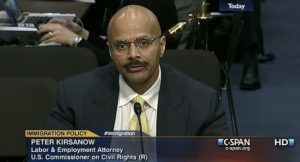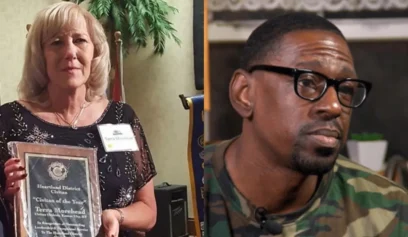
Peter Kirsanow. C-Span.
A member of the U.S. Commission on Civil Rights condemned a bill that would reduce jail sentences, arguing that it would lead to an increase in crime for African-American communities.
In a letter addressed to Sen. Chuck Grassley (R-Iowa), Commissioner Peter Kirsanow makes his case against the Sentencing Reform Act of 2015.
“Three years ago, the U.S. Commission on Civil Rights held a briefing on the Equal Employment Opportunity Commission’s [EEOC] revised guidance on the use of criminal background checks in hiring,” he wrote. “The guidance was motivated by many of the same concerns that seem to underlie the Sentencing Reform Act – primarily that minority men, particularly African-American men, are disproportionately likely to be incarcerated and have criminal records, a concern about burgeoning prison populations, and a sense that as a society we should focus on rehabilitation, not retribution.”
Kirsanow said the commission heard witnesses testify to the hardships faced by ex-convicts when looking for jobs, which he acknowledged was “a very real and troubling concern.” But he said the briefing was misleading, giving the impression that rehabilitation was common for ex-offenders and that ex-offenders were no different than the average non-offender.
“People who are convicted of a crime and imprisoned are a very small minority of the U.S. population – according to the EEOC, they comprise approximately 6.6 percent of the population. These people have managed to be less law-abiding than the remaining 93.4 percent of the U.S. population – quite a feat. It is perhaps less of a feat when one considers that many offenders have serious additional problems that likely incline them toward criminality.”
He cited Dr. Matt Delisi’s testimony at a 2013 Senate Judiciary hearing. DeLisi said ex-convicts show signs of psychopathy at a rate at least “25-fold” higher than the general public and testified, “releasing 1% of the current BOP [Bureau of Prisons] population would result in approximately 37,230 additional murders rapes [sic], robberies, aggravated assaults, burglaries, thefts, auto thefts, and incidents of arson.”
Delisi said there was not enough reliable evidence to support the advantages of rehabilitation because most studies fail to control for selection bias.
For this reason, Kirsanow wrote, sentencing should be handled on an individual basis, by judges and parole officers with better knowledge of the offender and crime.
And Kirsanow said the issue directly affects him, as he lives in a “high-crime, predominantly African-American neighborhood” in inner-city Cleveland.
“For my neighbors and me, these concerns are not remote. When these men are released from prison earlier than they otherwise would have been, they are coming back to my neighborhood and neighborhoods like mine. You cannot wish away the deleterious consequences of releasing unreformed criminals when they are released into your own neighborhood.”
In short, because it is too difficult to predict which ex-offenders are less likely to repeat crimes or benefit from rehabilitation, the solution is to keep them incarcerated for as long as possible for the greater good of the Black community.
In an email to the Atlanta Black Star, Kirsanow’s personal assistant Carissa Mulder confirmed the commissioner sent the letter on May 5.
Who is Peter Kirsanow and how did he end up on the Commission?
The Cleveland labor and employment attorney seems an unlikely candidate for the independent, bipartisan federal agency charged with “appraising the laws and policies of the Federal Government with respect to equal protection of the laws under the Constitution,” according to the Civil Rights Act of 1957.
He strongly opposes affirmative action in higher education. In fact, the late Justice Antonin Scalia made reference to one of Kirsanow’s briefs during his infamous remarks about Black college students benefiting from “less advanced,” “slower-track schools where they do well.” In the brief, Kirsanow and fellow commissioner Gail Heriot argued that the policy deters African-American students from choosing STEM majors. Those who do often graduate from less reputable universities, the brief said.
He does not support the Black Lives Matter movement. Kirsanow appeared on a Heritage Foundation panel to discuss the Supreme Court’s University of Texas vs. Fisher case in 2015. There, he denounced BLM protestors as “precious little flowers,” according to The Huffington Post.
“They are these precious little flowers that believe they’ve been discriminated against, 50 years after passage of the 1964 Civil Rights Act,” he said. “It is incredible what we’re countenancing here.”
He then criticized the concept of white privilege.
“I keep hearing about white privilege. The most privileged students in schools in 2015 America are Hispanic and Black students by far,” he said at the discussion.
The Atlanta Black Star reported on the complaint he filed with the U.S. Department of Education against the University of Connecticut. University officials planned to set aside a campus dormitory wing for Black male students. Kirsanow slammed the action as “Orwellian” and “promoting the ‘ghettoization’ of Black males.”
“Universities are not places for ethnic navel-gazing, they should be places where our intellects are broadened, where our comforts are challenged, where our interactions include those who do not look or think like us,” he said in a feature for Education Dive.
His nomination to the Commission by President George W. Bush was met with fierce opposition from left-leaning leaders and organizations. They fought his appointment all the way to the Supreme Court, with Chairwoman Mary Frances Berry telling White House counsel Alberto Gonzales he would need “federal marshals” to seat him.
Today Kirsanow is the longest-serving member on the Commission.


